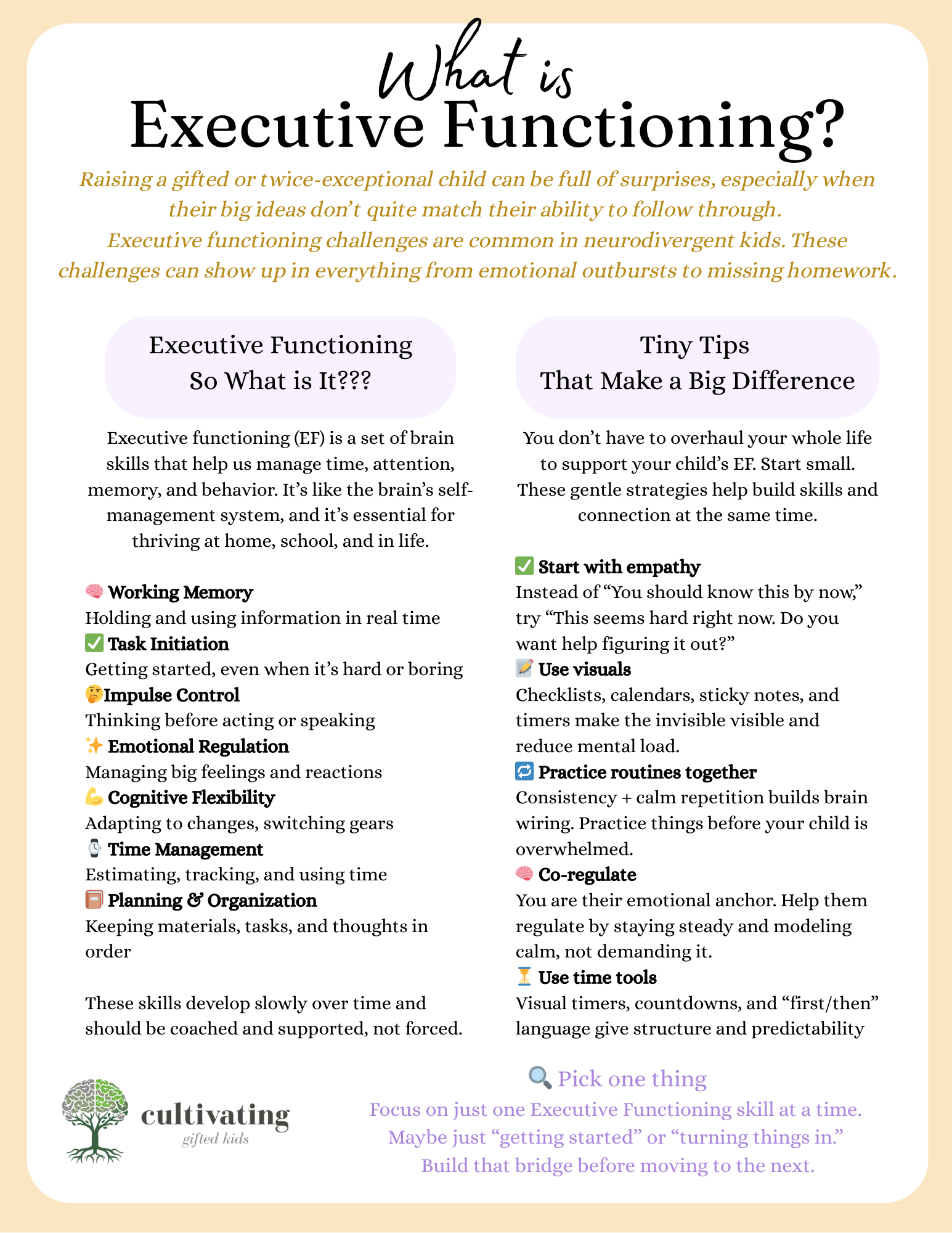What IS Executive Functioning?
And Why Does It Matter for Gifted and Twice-Exceptional Kids?
If you’ve ever wondered how your child can be so brilliant and yet struggle with the simplest things, like starting homework, remembering their backpack, or handling a change in routine, you’re not alone. For many parents raising gifted or twice-exceptional (2e) kids, this mismatch between ability and execution can be one of the most confusing (and frustrating) parts of the journey.
You might hear phrases like:
“He just needs to try harder.”
“She’s so smart, but she never turns anything in.”
“I know he knows this, but he completely blanked during the test.”
“She melts down over the tiniest thing.”
And deep down, you know it’s not laziness or defiance. There’s something else going on beneath the surface.
That something is often executive functioning.
So, What Is Executive Functioning?
Executive functioning (EF) is a term used to describe a set of mental skills that help us manage life. Think of it like the brain’s self-management system: the tools we use to plan, focus, remember, regulate emotions, and get things done.
These aren’t just academic skills. They affect everything from morning routines to emotional reactions to social interactions.
Key EF skills include:
Working Memory – Holding information in your head and using it
Task Initiation – Being able to start a task, especially one that feels boring or overwhelming
Impulse Control – Thinking before acting or speaking
Emotional Regulation – Managing big feelings and reactions
Time Management – Estimating and using time effectively
Cognitive Flexibility – Adapting to changes or shifting between tasks
Organization & Planning – Keeping materials, ideas, and responsibilities in order
These skills take time to develop, sometimes well into the mid-20s for many people. And for neurodivergent kids, especially those with ADHD, autism, or who are twice-exceptional, these skills may develop unevenly. In upcoming posts, I’ll be exploring each of these skills in more depth including: what they look like, why they matter, and how you can support them at home.
✨ Make sure to subscribe to my newsletter or follow along on Facebook or Instagram so you don’t miss a post!
That’s why a child who can debate the structure of black holes might still fall apart when asked to write a paragraph or remember to bring their planner home.
It’s Not Just You. It’s Not Just Your Kid.
Executive functioning struggles are incredibly common among gifted and 2e kids, but they’re often misunderstood. Because these kids are bright, their challenges can be mislabeled as laziness, lack of motivation, or even defiance.
But when we understand what EF really is, we can shift our mindset and our approach. These kids don’t need more discipline or lectures. They need support, scaffolding, and skills that meet them where they are.
Need Help?
If you’re in the thick of this with your child and wondering where to start, I’d love to help.
I offer executive functioning coaching for tweens and teens, both virtually and in person (in Thurston County, WA). Coaching provides a safe, supportive space to build self-awareness, develop practical strategies, and slowly strengthen those EF muscles without shame or pressure.
Whether your child needs help managing school demands, regulating emotions, or creating routines that actually work for their brain, coaching can make a real difference.
👉 You can contact me here to learn more or set up a free consultation call.
Download the FREE One-Page Executive Function Guide
Want a simple, clear way to understand EF and start supporting your child right away?
I created a free one-page executive functioning guide just for you. It breaks down the basics of EF and offers tiny, doable tips to help you get started. It's part of my free resource library for parents of gifted and twice-exceptional kids.
Print it out and put it on the fridge or next to the front door!

